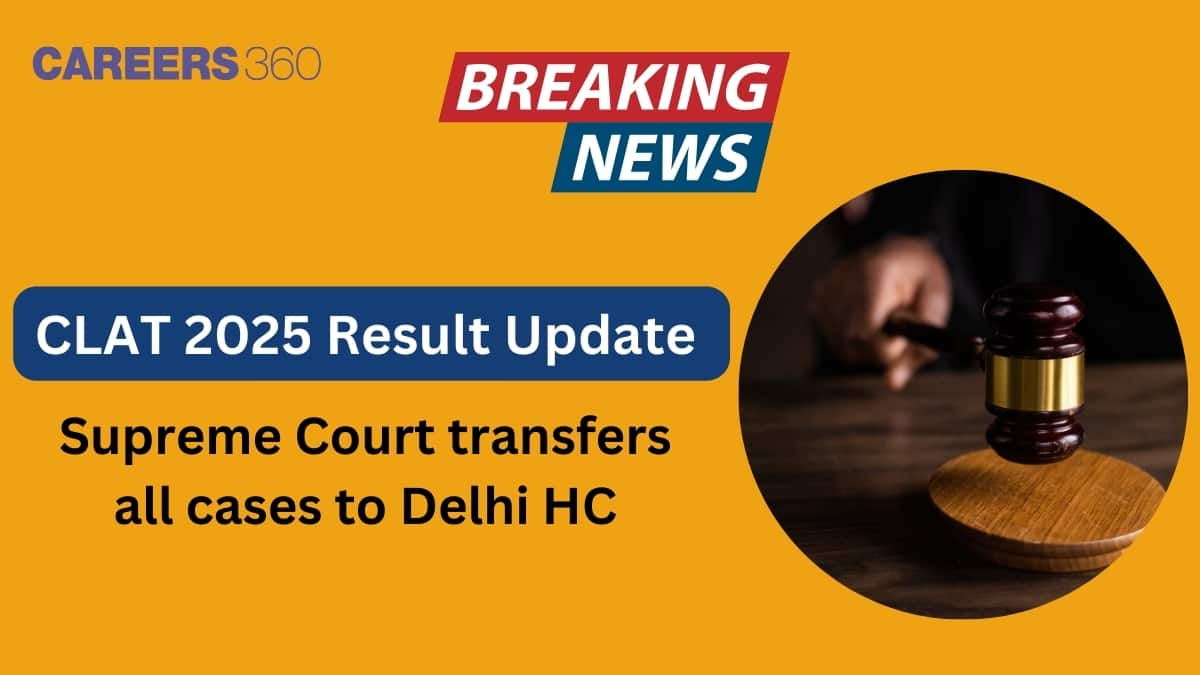CLAT 2025 Result Update: Supreme Court transfers all cases to Delhi HC, All you need to know
The Supreme Court has transferred all CLAT-related cases pending before various high courts to the Delhi High Court. The court initially intended to transfer these cases to the Punjab and Haryana High Court for early disposal. However, in today's hearing, the Bench of Chief Justice of India Sanjiv Khanna and Justices PV Sanjay Kumar and KV Viswanathan passed the order to list all such cases before Delhi HC on March 3.

In this regard, it directed all High Courts to send the case papers to the Delhi High Court within 7 days.
Now, what next?
Students across the country have challenged both CLAT UG and PG results and final answer keys in various high courts.
The CLAT UG results-related cases are pending before Delhi HC, Rajasthan and Punjab and Haryana High courts, whereas the MP High Court and Bombay High Court had given interim orders on CLAT PG result, making it subject to the outcome of these writ petitions.
Now, the big question is, will the CLAT 2025 results be revised?
In this regard, the Delhi High Court has already given a major judgment; when January 20, a Single judge, Justice Jyoti Singh asked the consortium to revisit the UG merit list.
This order was later sustained in the division bench of Delhi HC. The consortium was asked to accept the single judge judgment. Following this, it took the matter to the Supreme Court.
Now, as the matter is again going to be listed before Delhi HC, the previous judgment asking the consortium to revise CLAT UG results becomes relevant again. The CLAT UG results are likely to be revised once the Delhi HC takes up all cases; a revision either involving the two questions or all four questions raised by the petitioner, remains to be seen.
Regarding CLAT PG results, 12 questions were challenged in the Supreme Court along with objections against the exorbitant objection fee charged by Consortium.
The SC declined to entertain the plea stating that it cannot be the court of first instance, and asked the petitioner to move to a High Court. This matter went to the MP High Court, but now will be listed before Delhi HC along with all other cases. A revision in CLAT PG results where objections have been raised against 8-12 questions means, the merit lists will be changed significantly if the next hearing goes in favour of the petitioners.
Meanwhile, the delay in CLAT counselling means that not only the admission process of NLUs is getting delayed, but many other law colleges in India that depend on CLAT scores will also face delays in the admission process.
List of colleges accepting exam
Browse Law Colleges by State
Applications for Admissions are open.
Among top 100 Universities Globally in the Times Higher Education (THE) Interdisciplinary Science Rankings 2026
SRM University, Chennai Law UG 2026
ApplyNAAC A++ Accredited | Ranked #11 by NIRF
SRM University, Chennai LLM 2026
ApplyNAAC A++ Accredited | Ranked #11 by NIRF
Chandigarh University Admissions 2026
ApplyNAAC A+ Accredited | Among top 2% Universities Globally (QS World University Rankings 2026)
RV University, Bangalore | Law Admissions 2026
ApplyExcellent curriculum; an impressive range of electives, besides core law courses. Up to 100% merit scholarship on a first-come, first-served basis
UPES Integrated LLB Admissions 2026
ApplyLast Date to Apply: 25th Feb | Ranked #18 amongst Institutions in India by NIRF | Ranked #1 in India for Academic Reputation by QS Rankings | 16 LPA Highest CTC
